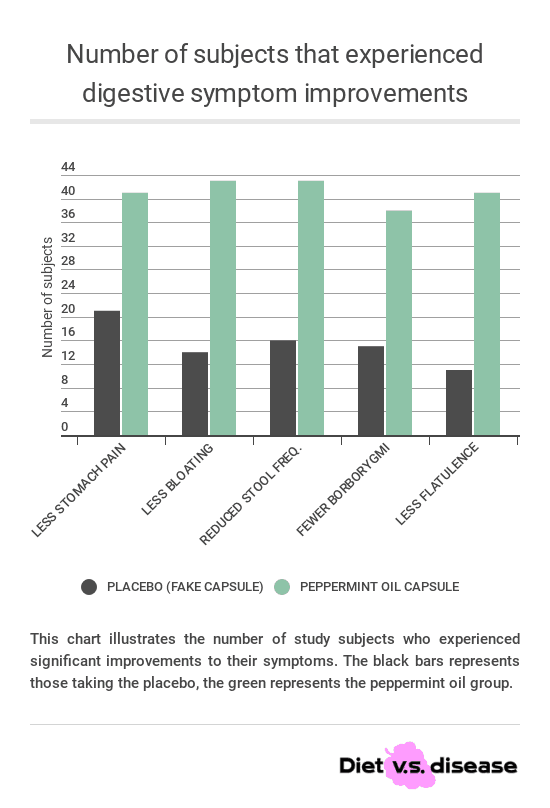[Last updated 14th August, 2018]
The use of peppermint can be traced back several thousand years.
The ancient Egyptians, Romans and other civilizations reportedly used peppermint for its pain-relieving and anti-bacterial properties.
These days peppermint essential oil and capsules are used for a variety of health concerns, particularly digestive issues and headaches.
This article looks at the main uses of peppermint oil and which health claims have scientific evidence behind them.
What Is Peppermint Oil?

Peppermint is a hybrid plant of spearmint and watermint.
It’s scientific name is mentha piperita.
The oil in peppermint (its essential oil) is responsible for its pleasant fragrance and also its health properties.
Specifically, peppermint essential oil ranges from 35 to 70% menthol, 15 to 20% methone, 4 to 14% menthyl acetate, and several other trace compounds. Menthol is thought to be the bioactive ingredient responsible for its benefits (1).
These days peppermint oil is typically used topically (applied to the skin) or in softgel capsules as a dietary supplement. The leaves are also used for tea.
Key Insight: Peppermint oil (mentha piperita) contains a large amount of menthol, which is thought to be the bioactive compound with health benefits. It’s used either as a topical oil or taken in a capsule form.
Peppermint Oil For IBS
Irritable bowel syndrome (IBS) is characterized by long-term digestive stress with symptoms like abdominal pain, bloating and changes in stool patterns.
Ingesting peppermint oil is shown to improve symptoms for up to 79% of those with IBS (2).
This 1-month clinical study compared 52 patients taking a peppermint oil capsule 3-4 times per day vs 49 taking a placebo capsule. Neither the subjects nor the researchers knew which patients were receiving which capsule (3).
Of the peppermint oil group:
- 79% experienced a reduction in abdominal pain
- 83% had less bloating (distension)
- 83% had reduced stool frequency
- 73% had fewer borboygmi (stomach gurgling)
- 79% experienced less flatulence.
These improvements were dramatically better than the placebo group as illustrated by this chart.

The placebo group experienced benefits because of the placebo effect (if you think the capsule helps you, then it will to some extent).
Peppermint oil is thought to work because of the menthol, which helps relax the stomach and digestive tract muscles. This helps speed up digestion in the stomach, which improves symptoms of nausea, indigestion and abdominal pain (4, 5).
Additionally, it can slow down motility in the colon (large intestine) by reducing intestinal spasms. In fact, when added to barium enema preparations during rectal exams, peppermint oil reduces colon spasms by 25 to 30% (6, 7).
This effect also likely helps to improve symptoms of flatulence, bloating and altered bowel movements.
Key Insight: Peppermint oil can offer relief from IBS symptoms. By increasing motility in the stomach and reducing motility in the colon, it may help with indigestion, stomach pain, colon spasms and gas.
Peppermint Oil Benefits For Indigestion

Indigestion, or dyspepsia, is often associated with acid reflux (“heart burn”), stomach spasms, pain and early feelings of fullness.
Peppermint oil may help an upset stomach by reducing contractions in the esophagus (8).
Enteroplant, a product that combines peppermint and caraway oil, is comparable to prescription drug Cisapride for relieving dyspepsia symptoms when taken two to three times per day for up to four weeks (9).
Another herbal product called Iberogast, which contains various herbs including peppermint oil, has been shown to improve the severity of acid reflux, stomach pain, cramping, nausea and vomiting compared to placebo (10).
Patients undergoing endoscopy can also use peppermint oil to reduce pain and spasms associated with this procedure (11, 12).
Key Insight: Peppermint oil capsules appear to help with indigestion by reducing stomach spasms and early feelings of fullness.
Reducing Headaches and Pain

Some evidence supports the topical use of peppermint oil to relieve tension headaches (15, 16).
The methanol in peppermint oil is thought to inhibit the sensitivity of pain receptors and may also alter pain perception (17).
Additionally, peppermint oil used as aromatherapy may help with other chronic pain conditions by enhancing the parasympathetic relaxation response (18).
Key Insight: Applying peppermint oil topically or using it as aromatherapy may help improve headaches and other chronic pain conditions.
Preventing Oil Benefits For Nipple Cracks

When applied topically, peppermint oil may help with cracked skin and pain in the nipple area of breastfeeding women (13).
In a study of 196 breastfeeding women, those using peppermint water were less likely to experience areola and nipple cracks and pain than those using breast milk (13).
Another study of 216 breastfeeding women found that applying peppermint oil gel was more effective in reducing nipple cracks than lanolin or a neutral ointment (14).
However, there is an important caveat here.
In some women, topical (on the skin) use of peppermint oil may reduce milk supply. In fact, it is a potential treatment method for hypergalactia (over-abundant milk supply) so keep that in mind (27).
It’s also advised to make sure peppermint oil is removed before feeding your baby.
Key Insight: Peppermint oil applied topically to breasts helps prevent nipple cracks and pain associated with breastfeeding.
Peppermint Oil For Hair Growth, Allergies and Anxiety

The use of peppermint oil for other types of conditions hasn’t been studied as extensively.
However, early research shows promising results for hair growth, allergies and anxiety.
The only evidence for hair growth was a study on mice that compared topical application of peppermint oil against placebo and jojoba oil. It appeared to facilitate hair growth the most, at least in mice (19).
A few studies have found that peppermint oil may help with allergies by inhibiting histamine release (20, 21).
Another study on 77 nursing students found that the use of aromatherapy treatments (including peppermint, lavender, rosemary, etc.) decreased physical and perceived stress responses in just 5 days (22).
It’s a promising area, but I wouldn’t get carried away with these findings just yet.
Key Insight: Peppermint oil may also help with allergies and relieve stress, though evidence is still limited at this time.
How Do I Use Peppermint Oil?

There are various preparations and dosing instructions depending on what you’re using peppermint oil for.
Below are usage tips for IBS and headaches, which are the two most evidence-based benefits.
For IBS:
- Use 400mg to 750mg enteric-coated peppermint oil (33% to 50% methanol) capsules in divided doses between meals. If consumed with meals, the capsule may break in the stomach rather than the intestine, causing reflux.
- Do not use consistently for longer than 8 weeks as long-term safety is not known.
- Keep in mind that benefits are only experienced while supplementing. Unless you take other measures to manage IBS (such as a low FODMAP diet), symptoms may come back after discontinuing its use.
For headaches:
- Use a 10% peppermint oil topical solution.
- Apply a thin layer to the front of your head at the start of a headache.
- Apply two more applications, one after 15 minutes and another after 30 minutes.
Other forms of peppermint can be found in aromatherapy, teas, minced leaves for cooking, barium enemas, inhaled oils and flavoring agents.
Key Insight: Numerous peppermint preparations are available. Make sure to use peppermint oil as instructed for its intended benefit.
Common Peppermint Oil Capsules

Many popular peppermint products are on the market.
Here is an example of some popular peppermint oil products:
Enteroplant
- Ingredients: 90mg of peppermint oil, 50mg of caraway oil
- Dose: Use two to three times daily for up to four weeks.
Iberogast (STW 5-II)
- Ingredients: Peppermint leaf, clown’s mustard plant, German chamomile, caraway, licorice root, milk thistle, angelica, celandine, lemon balm
- Dose: Use one milliliter three times daily for up to four weeks.
Colpermin
- Ingredients: Peppermint oil
- Dose: Take one capsule three times per day, 30 to 60 minutes before meals. Do not use more than 14 days.
Who Should Avoid Peppermint Oil?

When used as instructed, peppermint oil is generally safe, but certain people may experience potential adverse effects.
Low Iron Levels
Those with low iron levels or iron-deficiency anemia should avoid peppermint products because they may inhibit iron absorption (24).
Drug Interactions
People taking prescription medications or herbs should take caution when using peppermint oil due to potential interactions.
Like grapefruit juice, peppermint oil can inhibit many of the pathways responsible for metabolizing commonly used drugs. Check with your doctor for any potential interactions before starting peppermint products.
Reduced Stomach Acid
If you have low or no stomach acid it may be wise to avoid peppermint oil capsules.
This includes people using acid-blocking medications like antacids, H2-blockers and proton-pump inhibitors (PPIs) as they reduce the acidity of the stomach.
If you’re still interested in using peppermint oil for digestive relief, separate these products by at least two hours.
Chronic Diarrhea
Those with chronic diarrhea may want to avoid peppermint oil until the diarrhea resolves.
Diarrhea means there is faster movement along the digestive tract. This can lead to the peppermint oil getting to the colon and rectum too quickly in high concentrations, producing anal burning (25).
Poor Tolerance
Do not use peppermint oil if you notice a negative response.
When applied topically, some people experience skin irritation and contact dermatitis (26).
There have also been rare reports of digestive burning, nausea, vomiting, stomach pain, belching, dry mouth and increased appetite when using peppermint oil.
Pregnant or Lactating Women
Peppermint oil is not approved for pregnant or lactating women as its safety is still unknown in this population.
Key Insight: People with low iron levels, poor tolerance, and pregnant and lactating women should avoid peppermint oil. Those with low or no stomach acid, chronic diarrhea, or on other medication should use with caution or specific guidance.
Where to Buy Peppermint Oil?
Peppermint oil, both as an essential oil and in capsule form, is widely available in store and online.
Walmart stocks peppermint oil, as does Amazon.
The range and choice is much better on Amazon.
So What Uses of Peppermint Oil Actually Have Benefits?
The scientific evidence supports the use of peppermint oil capsules for those with IBS and indigestion.
Topical use (on the skin) of peppermint essential oil only appears useful for headaches at this stage. More research is needed to recommend its use for hair growth, allergies and stress.
Peppermint oil is typically well-tolerated and safe, but be sure to use it as instructed on the label. Keep in mind that symptoms may come back after discontinuing its use.
Considering it’s easily accessible and affordable, it’s certainly worth a try, especially if your digestive health is far from “mint condition”.
What Can And Can’t I Eat On The Low FODMAP Diet?
Often it’s easiest to start with this giant list I’ve made of what foods to eat, and what foods to avoid when following a low FODMAP diet.
It’s based on the latest published FODMAPs data (1, 2, 3, 4, 5).
Print or save to your phone to use as a quick-reference guide when shopping or cooking. I’ve attempted to list foods in both US and UK/Aus names, with US first.
I’ve included a screenshot of the first page below. But the full PDF is 4 pages and suitable for printing. To download it simply tap the box below and it will then be emailed straight to you – it’s free!



Leave a Reply